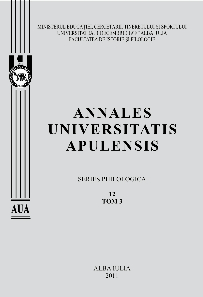Paths of Self-Awareness in Point Counter Point
Paths of Self-Awareness in Point Counter Point
Author(s): Nicoleta Petronela ApostolSubject(s): Literary Texts
Published by: Universitatea »1 Decembrie 1918« Alba Iulia
Keywords: awareness; judgment; self; other; degree
Summary/Abstract: The paper focuses mainly on two characters from Aldous Huxley’s Point Counter Point, Walter Bidlake and Marjorie Carling and on the relations established between themselves and the ones surrounding them. The starting point of this undertaking is the idea that literature offers its readers a means of interacting with their own selves through a confrontation with the fictional world and this interaction results in a refinement of the readers’ intellectual, emotional, ethical or aesthetical insights. In Point Counter Point, Huxley brings on stage the sense of disorientation dwelling the individuals of the 1920s and their struggle to attain some sort of purpose for their existence. The road they take presupposes a passage through peculiar degrees of self-comprehension accompanied by the awareness of the other, who, at different moments, demands an unavoidable response from the self. The interactions between the individuals’ desires, expectations, hopes, interests, potentialities etc. along with the readers’ engagement with the narrative and the authorial guidance they perceive in their undertaking lead to the configuration and validation of several degrees of comprehension / awareness attending the individuals’ construction of the self. In our interpretation of Huxley’s representation of the individual self with reference to Walter Bidlake and Marjorie Carling, we resort to James Phelan’s rhetorical ethical criticism which places at the centre of the critical literary inquiry the interrelation established between the author, the text and the readers. Phelan’s contention is that the reading experience entails the readers’ judgments upon the characters and their choices, thoughts, attitudes, etc. and their engagement with the narrative depends intensely on the type of judgments they draw. Walter and Marjorie appear in Point Counter Point like two spheres barely touching each other while pursuing the indefinite path of their existence. The tangible, the physical proximity between the two increases the intangible, the mental distance along with the various layers of awareness (about the self and about the other) they acquire on this journey. Each step taken in the direction of comprehending (being aware of) the inner and the outer world along with the interrelatedness between the two realms represents the characters’ adjustment to the circumstances and their advancement on the path of self-elucidation. The novel invites its readers to reflect upon the following chain of inquiries: is self-awareness worth pursuing in a world of indifference and dominion of passions? Is the individual able to make a clear distinction between his/her physical desires and his/her intellectual and emotional needs? If yes, is he/she able to make the choice that best suits his/her present situation?
Journal: Annales Universitatis Apulensis. Series Philologica
- Issue Year: 12/2011
- Issue No: 2
- Page Range: 121-132
- Page Count: 10
- Language: English

